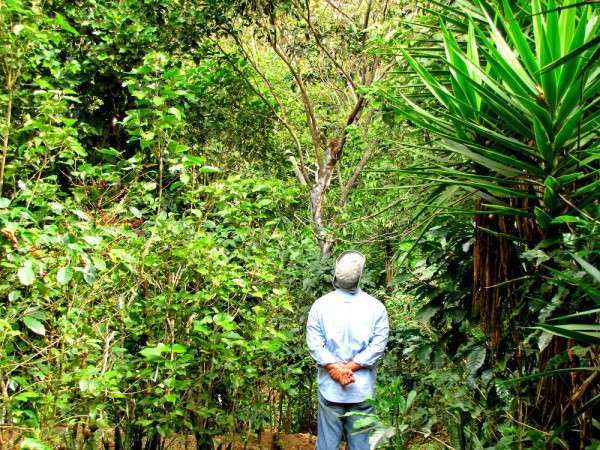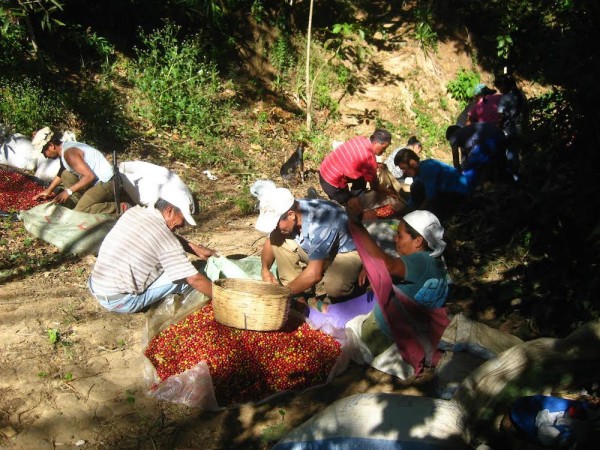We are at a time when permutations of the direct trade concept — a fuzzy one among roasters — are seemingly infinite. We could name any number of coffee roasters in the United States or abroad that purport direct trade and farmer equity as tenets of their operations, yet no two models for putting coffee into the hands of consumers are the same.
The latest model comes from Directo Caffè, an El Salvador-based coffee producer, buyer, roaster and exporter that hopes to build online sales and wholesale accounts among U.S. and Canadian consumers who are as interested in farmer equity as they are in quality roasted coffee.
(related: Born Into Coffee: Observations from a Third-Generation Colona in El Salvador)
Directo Caffè comes from Álvaro Castro, a native Salvadoran who envisions the brand as a way to promote his family’s own 42-hectare coffee farm on the slopes of the Apaneca-Ilamatepec mountain range in the department Ahuachapán, as well as other Salvadoran cooperatives. In the process, Castro hopes the business can help protect the welfare of farmers by giving them ownership of their green coffee, including a return of approximately 70 percent more than what they are traditionally through selling to other third party mills.
“It is not the same to sell your beans to a mill or middleman as it is to partner with a company that will sell it on your behalf and share with you a bigger slice of the profits pie,” Castro recently told Daily Coffee News. “If Directo Caffè can create the opportunities to break the poverty cycle of farmers while delivering good quality coffee to the consumer, then we would have accomplished our mission.”
(related: 1000 Faces, Ken Kesey’s Psychedelic Hay and Packaging Varietals Side by Side)
Castro is currently outsourcing roasting of the coffees — including a single-variety Paca and a blend from his family farm, as well as a blend from a nearby Salvadoran cooperative — to a San Salvador-based roaster, and he hopes to use revenue from the venture to renovate the farm’s drying patio and perhaps built new milling equipment and install roasting equipment.
Castro is adamant that the business does not represent some kind of charitable handout to farmers; instead, it is a for-profit venture that provides greater direct benefits to farmers who may be trapped in a cycle of subsistence farming.
“Directo Caffè is a social enterprise created to increase the share of profits earned by farmers, thus helping them break poverty cycles,” he says. “Simultaneously, the coffee consumer receives a product with full traceability, premium quality and purchased directly from the person who produced it, not a broker.”
(related: Direct Trade Myths and Why Some Farmers Can’t Afford to Care About Quality)
It is the latest example of a quasi vertical integration in the specialty coffee business where companies from producing companies speak directly to U.S. consumers. Most recently, Colombia-focused Devoción comes to mind, recently opening a flashy 3,600-square-foot cafe in Williamsburg to promote its directly traded coffees. Castro’s U.S. storefront, so to speak, is currently limited to the company’s website and social media channels, where he hopes to drum up online sales by promoting individual farmers.
“I want to document the story of each farmer involved through our blog, ‘Farm Life,” he says, adding that he plans to do “before and after” profiles of farmers and their businesses based on their relationship with Directo Caffè. “I could very well settle for a full-time job and a middle-class living here or elsewhere, but I am committed to the economic and social development of the coffee producers in this country.”
(related: When Quality Falls Short: Exploring Risk in the High-End Specialty Trade)
As we discussed with the Vega Coffee founders back in July, one of the challenges with promoting farmer welfare as a virtue of a given coffee is skepticism among end consumers about quality controls. With that in mind, Castro says retail prices for each coffee sold are based on quality alone after cupping evaluations, rather than ancillary production costs.
“According to our calculations, a farmer who decides to sell his or her roasted beans through us would be making a larger gain compared to selling the cherries to a mill or middleman,” says Castro, “even if his or her coffee would be priced on the lowest price level.”
For More
Nick Brown
Nick Brown is the editor of Daily Coffee News by Roast Magazine.








Comment